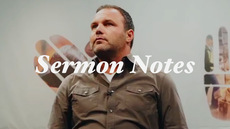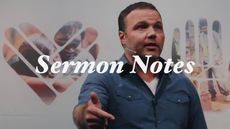“I say this not as a command but to prove by the earnestness of others that your love also is genuine. For you know the grace of our Lord Jesus Christ, that though he was rich, yet for your sake he became poor, so that you by his poverty might become rich.” 2 Corinthians 8:8–9
Generosity is a reminder of Jesus’ generosity.
Generosity reminds us of the crucifixion of Jesus.
Money is in every way a reflection of our theological and biblical convictions. If you say, “I believe Jesus Christ died on the cross for my sins,” then I would say, “How generous are you?” You may say, “What does my money have to do with my spirituality?” It has everything to do with your spirituality.
If you believe God is generous, you should be generous. If you believe God is a giver, you should be a giver. If you believe that God helps people, you should help people – not because you have to, but because you get to, because that’s how God has treated you.
The Story of Jesus
Here’s the story of Jesus: Jesus is God. He lived eternally in heaven. The Bible says he’s seated on a throne, surrounded by angels, being worshiped in glory.
God lacks nothing. God lives without any deficit, want, or need. And our great God and Savior, Jesus Christ, left heaven and he humbly and graciously came into human history.
How was he born? Into poverty to a teenage girl and a working class construction worker and adoptive father named Joseph. Was he born in a palace? No, he was born in a barn. He was laid in the manger.
Jesus was generous to go to the cross, suffer, and die to pay our debt of sin to God. Generosity is a gospel issue.
Jesus grew up in humble circumstances in a little town called Nazareth. His adoptive father didn’t make a lot of money. He had brothers and sisters, and their upbringing was a working-class, poor home. Jesus spent the first 30 years of his life swinging a hammer, working a blue-collar job. He then went into ministry, and that didn’t pay well either.
Jesus spent three years as a homeless guy, eating at people’s homes, and when it came time for him to pay taxes, he told his disciples to go fishing so that they could find a coin in the mouth of the fish to pay his taxes. I think it goes without saying, but if you get to a point financially that you’re fishing for fishes with coins or credit cards in their mouth to pay your taxes, you have come to a very difficult place financially.
Jesus was broke. Jesus was poor. And Jesus was generous.
Generosity Is a Gospel Issue
Jesus was generous to become a human being. Jesus was generous to live in poverty. Jesus was generous to go to the cross, suffer, and die to pay our debt of sin to God. Jesus rose three days later in victory over Satan, sin, and death to give us the generous gift of God the Holy Spirit, salvation, and eternal life. Jesus is the most generous giver who has ever lived.
Generosity is a gospel issue. Generosity is not a financial issue. Generosity is a gospel issue with financial implications.
Jesus is a giver. Generosity is a way of reminding others and ourselves about the generosity of our great God and Savior, the Lord Jesus Christ. This is why generosity is a gospel issue with financial implications.
Proportions, Not Percentages
Generosity is not about giving a set amount. Generosity is about grace giving according to a percentage that is generous for them.
Paul goes on to explain that our generosity is measured proportionately:
And in this matter I give my judgment: this benefits you, who a year ago started not only to do this work but also to desire to do it. So now finish doing it as well, so that your readiness in desiring it may be matched by your completing it out of what you have. For if the readiness is there, it is acceptable according to what a person has, not according to what he does not have (2 Cor. 8:10–12).
What he is saying is that you give out of what you have, not out of what you don’t have. For Christians generosity is about proportions, not percentages.
For some who are affluent, ten percent is not even generous. It’s not even sacrificial. You don’t even feel the pinch in your pockets.
For others, who live payday to payday with little to no discretionary income, your portion will be much smaller.
I encourage you to consider your level of generosity and ask, “What does it say about the gospel?” Am I being generous out of the portion I have?”
Adapted from the 2008 sermon “Generous, Part 1.”















